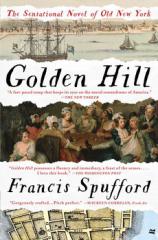Golden Hill: A Novel of Old New York
Review
Golden Hill: A Novel of Old New York
Francis Spufford, known in literary circles for his nonfiction work, has written his debut novel, GOLDEN HILL. Named “novel of the year” by the UK’s Sunday Times, its introduction to US readers will tell its own tale.
The book is set in the year 1746 in New York, which at the time was a small town on the tip of Manhattan island, and introduces readers to Richard Smith, a robust and energetic man fresh off the boat. He declines an offer to carry his baggage, hoisting it easily on his shoulder and nearly running to his destination: the counting house of Lovell & Company on Golden Hill Street. At closing time, Mr. Lovell sees the intrusion as a bother. Mr. Smith presents a paid-in-full bank note from his contact in London for the sum of a thousand pounds.
"The book boasts well of the color and flavor of 18th-century New York.... The novel’s literary essence separates it from mainstream American writings, and one can visualize a British broadcaster bringing Mr. Smith’s story to the small screen."
Lovell is reluctant to cash the note but agrees to a 60-day term. Meanwhile, Smith teases and cajoles, leaving Lovell to question his character. He states that his business is “confidential” in nature; he is sort of an entrepreneur, buying and selling to make a profit, but does not reveal the exact nature of his business. The scene is set, with New Yorkers left eager to discover whether Smith is a scalawag or an upstanding gentleman.
Spufford’s style is British, using language and terms familiar to those of the era. The American reader will find the literary appeal compelling but difficult to master. The book boasts well of the color and flavor of 18th-century New York. The majority of the action centers on the Golden Hill neighborhood, the home of affluent businessmen and merchants. Smith is a curious, well-heeled man, whose motives are not disclosed until the story's final pages.
Lovell is a major player, doubting the reality of Smith’s paper but unwilling to shut the man out without a trial period. Having secured a boarding house room, Smith uses his natural charms to inveigle his way into the dining rooms of New York’s elite. Lovell’s two daughters, Flora and Tabitha, hold sway in their father’s sugar cane business, and Smith becomes a fascinating “catch” for both. However, it’s Tabitha, the unruly girl who speaks her mind openly, who discovers a soulmate in the bizarre and mysterious gentleman, and her motives are ambiguous at best.
In time, Smith meets a troupe of actors who practice for a play performed at Christmastime and manages to secure the lead part, putting other community performers to shame. But papers from London that guarantee his ownership of the large note do not arrive by the intended ship. He is ridiculed as an imposter, an actor, playing New York’s citizenry for fools. A false charge of murder is then leveled against him. Letters written to his father show his remorse at having volunteered for the trip to conduct English business.
Although it was challenging to read GOLDEN HILL to the end, I am glad I gave it a second chance. The novel’s literary essence separates it from mainstream American writings, and one can visualize a British broadcaster bringing Mr. Smith’s story to the small screen.
Reviewed by Judy Gigstad on July 21, 2017
Golden Hill: A Novel of Old New York
- Publication Date: February 6, 2018
- Genres: Fiction, Historical Fiction
- Paperback: 320 pages
- Publisher: Scribner
- ISBN-10: 1501163884
- ISBN-13: 9781501163883




